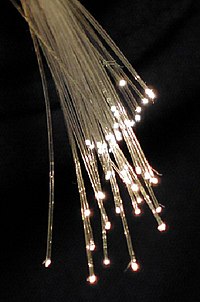
Photo from wikipedia
Fiber‐based implantable electronics are one of promising candidates for in vivo biomedical applications thanks to their unique structural advantages. However, development of fiber‐based implantable electronic devices with biodegradable capability remains… Click to show full abstract
Fiber‐based implantable electronics are one of promising candidates for in vivo biomedical applications thanks to their unique structural advantages. However, development of fiber‐based implantable electronic devices with biodegradable capability remains a challenge due to the lack of biodegradable fiber electrodes with high electrical and mechanical properties. Here, a biocompatible and biodegradable fiber electrode which simultaneously exhibits high electrical conductivity and mechanical robustness is presented. The fiber electrode is fabricated through a facile approach that incorporates a large amount of Mo microparticles into outermost volume of a biodegradable polycaprolactone (PCL) fiber scaffold in a concentrated manner. The biodegradable fiber electrode simultaneously exhibits a remarkable electrical performance (≈43.5 Ω cm−1), mechanical robustness, bending stability, and durability for more than 4000 bending cycles based on the Mo/PCL conductive layer and intact PCL core in the fiber electrode. The electrical behavior of the biodegradable fiber electrode under the bending deformation is analyzed by an analytical prediction and a numerical simulation. In addition, the biocompatible properties and degradation behavior of the fiber electrode are systematically investigated. The potential of biodegradable fiber electrode is demonstrated in various applications such as an interconnect, a suturable temperature sensor, and an in vivo electrical stimulator.
Journal Title: Advanced Science
Year Published: 2023
Link to full text (if available)
Share on Social Media: Sign Up to like & get
recommendations!